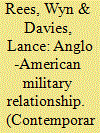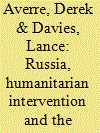| Srl | Item |
| 1 |
ID:
165128


|
|
|
|
|
| Summary/Abstract |
The Anglo-American military relationship is a vital yet neglected area of study. This article argues that the British military have actively cultivated a relationship with the U.S. military that has contributed to the longevity of the broader so-called “Special Relationship,” even in the Trump era. The article contends that the complexities of the military relationship can best be captured by the theoretical lens provided by Lowndes and Roberts that combines different strands of institutionalism to focus on rules, practices, and narratives. The intense linkages between the United States and United Kingdom have become routinized, enabling them to adapt their peacetime cooperation to conflicts, and thereby address post-Cold War security challenges. The article draws upon semi-structured interviews with senior British military officers as well as policy documents to explore how these patterns of collaboration have become ingrained in patterns of both thinking and behavior.
|
|
|
|
|
|
|
|
|
|
|
|
|
|
|
|
| 2 |
ID:
186195


|
|
|
|
|
| Summary/Abstract |
Recent analysis has interpreted Russia’s approach to the EU-led dialogue between Kosovo and Serbia through the lens of its actions in Ukraine. This has been characterised as “hybrid warfare” designed to disrupt the negotiations to prevent the integration of the Balkans into Western institutions. This article examines whether Russian actions in Ukraine have signalled a recalibration of Russia’s response to the Kosovo issue based on a repudiation of the EU-led dialogue. This article argues that while Russia’s behaviour has been shaped by its growing competition with the Western powers, its approach has been ambiguous and driven by a range of humanitarian, legal and security-based arguments rooted in the context of the Kosovo problem. These arguments have emerged as important trends in Russia’s behaviour and can be traced to its response to the Kosovo conflict in 1999. This article shows that there has not been a complete recalibration in Russia’s policy towards the dialogue. Russia’s approach has shown both continuity with these trends and a growing politicisation accelerated by the sharp decline in Russia’s relations with the West since 2014. In a broader sense, this article questions the intent and form of Russia’s actions in Ukraine as an explanatory framework for Russia’s behaviour elsewhere.
|
|
|
|
|
|
|
|
|
|
|
|
|
|
|
|
| 3 |
ID:
140272


|
|
|
|
|
| Summary/Abstract |
Western analysis perceives Russian approaches to issues of humanitarian intervention and the Responsibility to Protect (R2P) as running counter to western-inspired international norms. This debate has surfaced with some vigour over Russia's policy in the Syria conflict where, in order to protect its strategic interests in Syria, an obstructionist Moscow has been accused of ignoring humanitarian considerations and allowing time for the Assad regime to crush the opposition by vetoing a resolution threatening to impose sanctions. While Russian approaches are undoubtedly explained by a desire to maximize its growing political influence and trade advantages to serve its legitimate foreign policy interests, and while Moscow's attitudes to intervention and R2P exhibit important differences from those of the major western liberal democracies, its arguments are in fact framed within a largely rational argument rooted in ‘traditional’ state-centred international law. This article first highlights key arguments in the scholarly literature on intervention and R2P before going on to examine the evolution of Russian views on these issues. The analysis then focuses on the extent to which Moscow's arguments impact on international legal debates on the Libya and Syria conflicts. The article then seeks to explore how Russian approaches to intervention/R2P reflect fundamental trends in its foreign policy thinking and its quest for legitimacy in a negotiated international order. Finally, it attempts to raise some important questions regarding Russia's role in the future direction of the intervention/R2P debates.
|
|
|
|
|
|
|
|
|
|
|
|
|
|
|
|
| 4 |
ID:
146332


|
|
|
|
|
| Summary/Abstract |
This essay explores Russia’s involvement in the conflict in the Donbas by examining the extent to which Moscow’s contribution has demonstrated a governance approach. We argue that Russia’s engagement has remained in a perpetual state of flux due to contradictions in its policy, shaped by the interaction of a complex set of competing security logics. Opposing the view that Russia’s response is solely a policy of destabilisation, we put forward the view that Moscow’s behaviour has not ruled out a positive engagement in the settlement through the selective practice of certain norms and processes underpinning a governance approach.
|
|
|
|
|
|
|
|
|
|
|
|
|
|
|
|